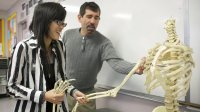Comprehensive Assessment Research Review
Editor's Note: This article was originally written by Vanessa Vega, with subsequent updates made by the Edutopia staff.
Edutopia’s Comprehensive Assessment Research Review covers a range of assessment practices that have been shown by extensive research to promote learning. We summarize this research according to three key steps of comprehensive assessment and then describe common pitfalls to avoid. We also provide an annotated bibliography for all references cited.
Why Does Assessment Matter?
Assessment is one of the most effective instructional strategies to increase learning. According to an analysis of approximately 800 meta-analyses, including more than 52,000 studies and millions of students, teachers who study their own effects on student learning are highly effective in raising student achievement (Hattie, 2009). According to two additional meta-analyses, high-quality assessment that is integrated into regular classroom practice can increase the rate of learning (Black & Wiliam, 1998) and is a highly cost-effective educational intervention (Yeh, 2007). Editor's note (2015): More recently, new analyses indicate that additional research is needed to better define successful formative assessment practices and their effects on student learning (Bennett, 2011; Briggs et al., 2012; Kingston & Nash, 2011).
What is Comprehensive Assessment?
Comprehensive assessment is a process of eliciting evidence of learners’ understanding and adapting instruction to increase their rate of learning. This process is integrated into regular classroom practice and involves three key steps:
- Set challenging, meaningful learning goals and provide learners with multifaceted criteria to define success.
- Use evidence of learners’ understanding to provide actionable feedback throughout the learning process.
- Motivate learners to improve their performance.
In the next three sections, we explain these assessment practices in detail, according to the research that has shown these practices to be effective for increasing learning.
Continue to the next section of the Comprehensive Assessment Research Review, Setting Goals.
